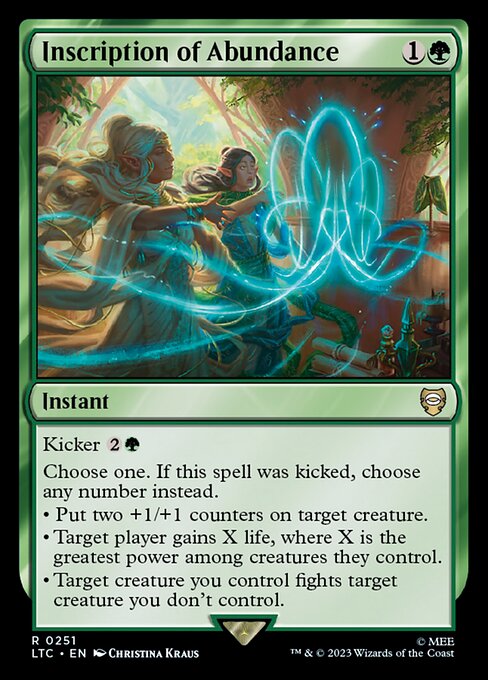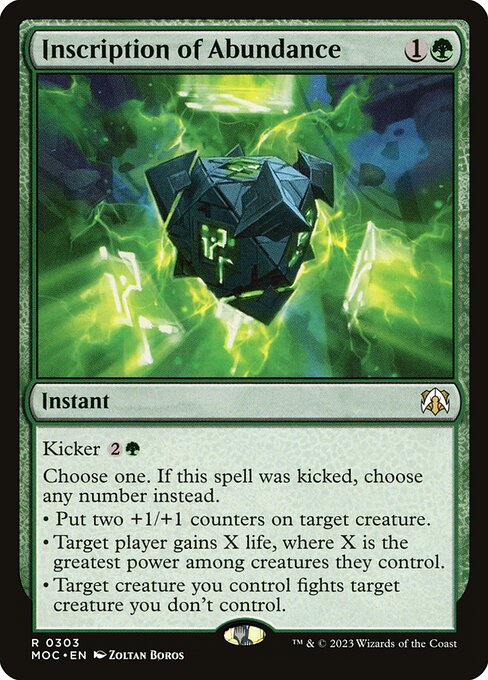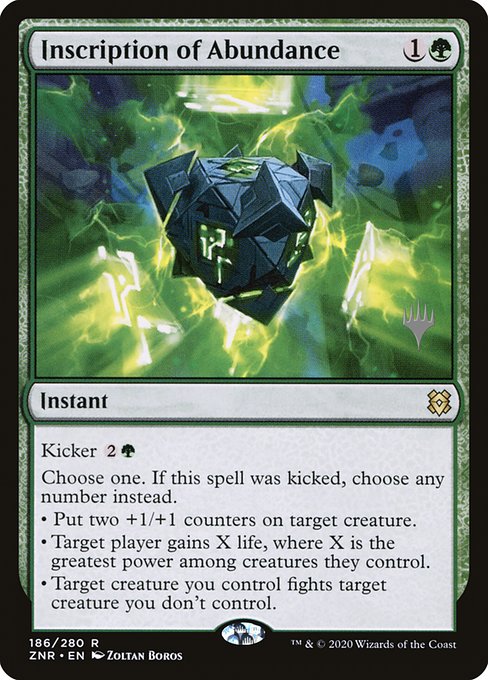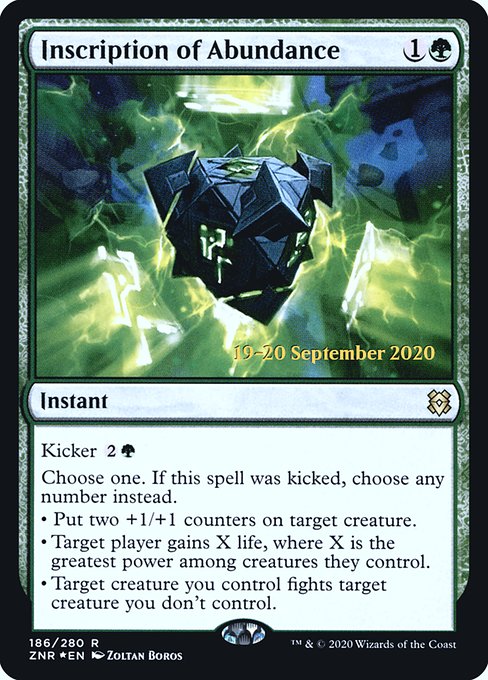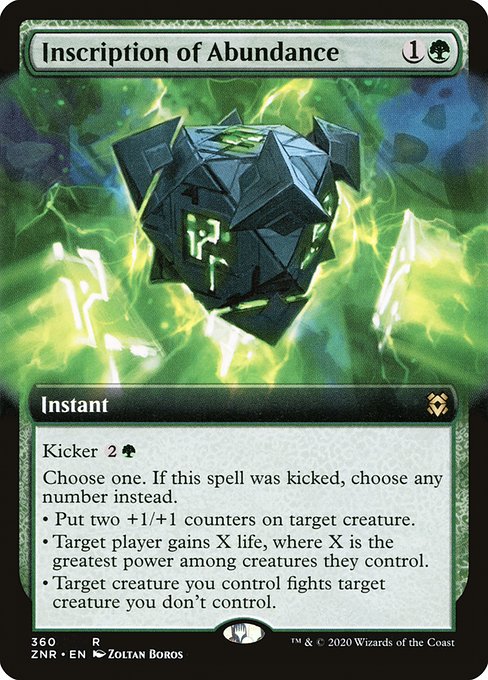Inschrift des Überflusses
Spontanzauber
Bonus
Bestimme eines. Falls die Bonuskosten dieses Zauberspruchs bezahlt wurden, bestimme stattdessen eine beliebige Anzahl.
• Lege zwei +1/+1-Marken auf eine Kreatur deiner Wahl.
• Ein Spieler deiner Wahl erhält X Lebenspunkte dazu, wobei X gleich der höchsten Stärke unter den Kreaturen ist, die er kontrolliert.
• Eine Kreatur deiner Wahl, die du kontrollierst, kämpft gegen eine Kreatur deiner Wahl, die du nicht kontrollierst.
Bestimme eines. Falls die Bonuskosten dieses Zauberspruchs bezahlt wurden, bestimme stattdessen eine beliebige Anzahl.
• Lege zwei +1/+1-Marken auf eine Kreatur deiner Wahl.
• Ein Spieler deiner Wahl erhält X Lebenspunkte dazu, wobei X gleich der höchsten Stärke unter den Kreaturen ist, die er kontrolliert.
• Eine Kreatur deiner Wahl, die du kontrollierst, kämpft gegen eine Kreatur deiner Wahl, die du nicht kontrollierst.
standard
future
historic
gladiator
pioneer
explorer
modern
legacy
pauper
vintage
penny
commander
brawl
alchemy
paupercommander
duel
oldschool
premodern
Rulings
If either target creature is an illegal target as Inscription of Abundance resolves with its last mode chosen, no creature will deal or be dealt damage.
If you copy a kicked spell, the copy is also kicked. If a card or token enters the battlefield as a copy of a permanent that’s already on the battlefield, the new permanent isn’t kicked, even if the original was.
If you put a permanent with a kicker ability onto the battlefield without casting it, you can’t kick it.
Kicker represents an optional additional cost that you may choose to pay as you cast the spell. A spell cast with that additional cost paid is “kicked.”
To determine a spell’s total cost, start with the mana cost (or an alternative cost if another card’s effect allows you to pay one instead), add any cost increases (such as kicker), then apply any cost reductions. The converted mana cost of the spell is determined only by its mana cost, no matter what the total cost to cast the spell was.
If more than one mode is chosen, perform them in the order written. Nothing can happen in between, however, and no player may choose to take actions. Any abilities that trigger will be put onto the stack after the spell has finished resolving.
If any targets become illegal, the other targets will still be affected as appropriate.
An ability that triggers when a player casts a kicked spell resolves before the spell that caused it to trigger, but after targets have been chosen for that spell. It resolves even if that spell is countered.
You can’t pay a kicker cost more than once.
If you kick Inscription of Abundance, you can’t choose any one mode more than once.
Some instant or sorcery spells require alternative or additional targets if they’re kicked. You ignore these targeting requirements if those spells aren’t kicked, and you can’t kick those spells unless you can choose the appropriate targets. On the other hand, you can kick a permanent spell even if you won’t be able to choose targets for an enters-the-battlefield ability of that permanent once the spell resolves.
If the second mode is chosen and each creature the target player controls has negative power, that player doesn’t gain or lose life.
If you copy a kicked spell, the copy is also kicked. If a card or token enters the battlefield as a copy of a permanent that’s already on the battlefield, the new permanent isn’t kicked, even if the original was.
If you put a permanent with a kicker ability onto the battlefield without casting it, you can’t kick it.
Kicker represents an optional additional cost that you may choose to pay as you cast the spell. A spell cast with that additional cost paid is “kicked.”
To determine a spell’s total cost, start with the mana cost (or an alternative cost if another card’s effect allows you to pay one instead), add any cost increases (such as kicker), then apply any cost reductions. The converted mana cost of the spell is determined only by its mana cost, no matter what the total cost to cast the spell was.
If more than one mode is chosen, perform them in the order written. Nothing can happen in between, however, and no player may choose to take actions. Any abilities that trigger will be put onto the stack after the spell has finished resolving.
If any targets become illegal, the other targets will still be affected as appropriate.
An ability that triggers when a player casts a kicked spell resolves before the spell that caused it to trigger, but after targets have been chosen for that spell. It resolves even if that spell is countered.
You can’t pay a kicker cost more than once.
If you kick Inscription of Abundance, you can’t choose any one mode more than once.
Some instant or sorcery spells require alternative or additional targets if they’re kicked. You ignore these targeting requirements if those spells aren’t kicked, and you can’t kick those spells unless you can choose the appropriate targets. On the other hand, you can kick a permanent spell even if you won’t be able to choose targets for an enters-the-battlefield ability of that permanent once the spell resolves.
If the second mode is chosen and each creature the target player controls has negative power, that player doesn’t gain or lose life.
Rulings
If either target creature is an illegal target as Inscription of Abundance resolves with its last mode chosen, no creature will deal or be dealt damage.
If you copy a kicked spell, the copy is also kicked. If a card or token enters the battlefield as a copy of a permanent that’s already on the battlefield, the new permanent isn’t kicked, even if the original was.
If you put a permanent with a kicker ability onto the battlefield without casting it, you can’t kick it.
Kicker represents an optional additional cost that you may choose to pay as you cast the spell. A spell cast with that additional cost paid is “kicked.”
To determine a spell’s total cost, start with the mana cost (or an alternative cost if another card’s effect allows you to pay one instead), add any cost increases (such as kicker), then apply any cost reductions. The converted mana cost of the spell is determined only by its mana cost, no matter what the total cost to cast the spell was.
If more than one mode is chosen, perform them in the order written. Nothing can happen in between, however, and no player may choose to take actions. Any abilities that trigger will be put onto the stack after the spell has finished resolving.
If any targets become illegal, the other targets will still be affected as appropriate.
An ability that triggers when a player casts a kicked spell resolves before the spell that caused it to trigger, but after targets have been chosen for that spell. It resolves even if that spell is countered.
You can’t pay a kicker cost more than once.
If you kick Inscription of Abundance, you can’t choose any one mode more than once.
Some instant or sorcery spells require alternative or additional targets if they’re kicked. You ignore these targeting requirements if those spells aren’t kicked, and you can’t kick those spells unless you can choose the appropriate targets. On the other hand, you can kick a permanent spell even if you won’t be able to choose targets for an enters-the-battlefield ability of that permanent once the spell resolves.
If the second mode is chosen and each creature the target player controls has negative power, that player doesn’t gain or lose life.
If you copy a kicked spell, the copy is also kicked. If a card or token enters the battlefield as a copy of a permanent that’s already on the battlefield, the new permanent isn’t kicked, even if the original was.
If you put a permanent with a kicker ability onto the battlefield without casting it, you can’t kick it.
Kicker represents an optional additional cost that you may choose to pay as you cast the spell. A spell cast with that additional cost paid is “kicked.”
To determine a spell’s total cost, start with the mana cost (or an alternative cost if another card’s effect allows you to pay one instead), add any cost increases (such as kicker), then apply any cost reductions. The converted mana cost of the spell is determined only by its mana cost, no matter what the total cost to cast the spell was.
If more than one mode is chosen, perform them in the order written. Nothing can happen in between, however, and no player may choose to take actions. Any abilities that trigger will be put onto the stack after the spell has finished resolving.
If any targets become illegal, the other targets will still be affected as appropriate.
An ability that triggers when a player casts a kicked spell resolves before the spell that caused it to trigger, but after targets have been chosen for that spell. It resolves even if that spell is countered.
You can’t pay a kicker cost more than once.
If you kick Inscription of Abundance, you can’t choose any one mode more than once.
Some instant or sorcery spells require alternative or additional targets if they’re kicked. You ignore these targeting requirements if those spells aren’t kicked, and you can’t kick those spells unless you can choose the appropriate targets. On the other hand, you can kick a permanent spell even if you won’t be able to choose targets for an enters-the-battlefield ability of that permanent once the spell resolves.
If the second mode is chosen and each creature the target player controls has negative power, that player doesn’t gain or lose life.
Votre collection ? vos decks ?
Envie de gérer votre collection et/ou créer des decks ?
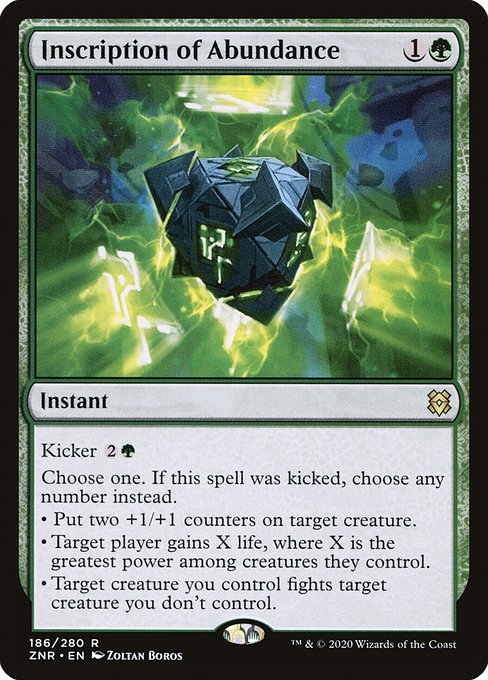

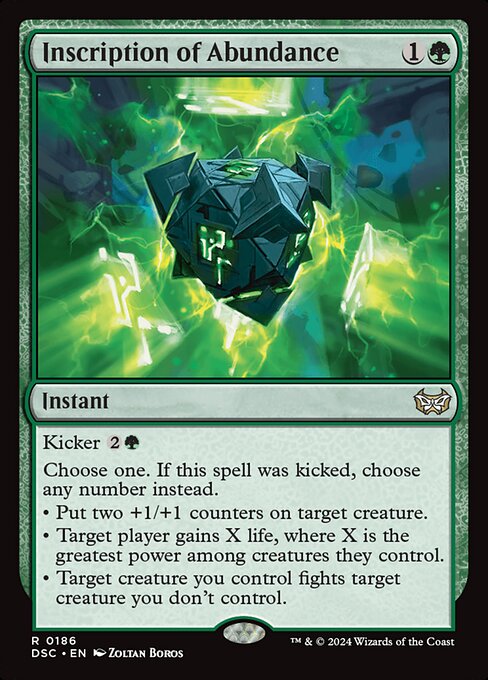
 0
0
 0.19€
0.19€
